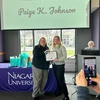On Monday, Oct. 9, Fredonia will celebrate Indigenous Peoples Day for the first time. From this year forward, the day will provide the university an opportunity to reflect on the contributions of many different indigenous peoples to American history in general and the region's history.
The Seneca Nation and the Haudenosaunee people were stewards of the land on which the university stands, noted President Virginia Horvath. Fredonia respects and honor their relationship with this land for many generations.
The suggestion that the U.S. celebrate Indigenous Peoples Day rather than Columbus Day emerged in 1977 at a United Nations-sponsored conference where the issue of discrimination against indigenous populations in the U.S. was confronted. By changing the focus of the day, the shift is from recollecting and prioritizing the violence associated with colonization to a day which emphasizes indigenous peoples' cultural traditions, resilience, and resistance.
In making the change, Fredonia is responding to the urging of the SUNY Student Assembly, which passed a resolution in 2015 calling on all SUNY campuses to acknowledge Indigenous Peoples Day. The university is are also joining cities like Los Angeles, Berkeley, Denver, Minneapolis, and Seattle and states like South Dakota, Hawaii, and Alaska, all of which have issued similar declarations over the years.
Events slated for the day include:
- A tree planting ceremony at noon between Thompson and Maytum halls.
- A program with guest speakers Michael Martin and Sue John Blacksnake at 6:30 p.m. in Rosch Recital Hall (Mason Hall)
on the history and importance of Indigenous Peoples Day.
Mr. Martin is an Onondaga of the Beaver Clan from the Six Nations of the Grand River territory in Southern Ontario, but was born and raised in Buffalo. An alumnus of SUNY Buffalo State, he has served as the executive director of Native American Community Services in Buffalo since 2004. His knowledge of indigenous cultures stems in part from his travels to Guatemala and Ecuador, where he participated in a cultural exchange and conference on sustaining indigenous cultures. He has also been selected as one of 18 participants in the Americans for Indian Opportunity’s two-year American Indian Ambassador Leadership Program.
Ms. John Blacksnake’s Salamanca High School students were among the first in the world to participate in the Model United Nations Permanent Forum on Indigenous Issues (UNPFII) in 2011. The goal of the forum is to raise concerns so that policies can be shaped that will affect lives locally. John Blacksnake and her students brought indigenous rights to the forefront of international discussion through their presentation on the human rights violations that occurred during the legislation and construction of the Kinzua Dam. John Blacksnake is a member of one of the 150 Seneca families impacted during the Kinzua Dam project in 1963-65. She is also an educational advocate from the Seneca Nation’s Allegany Territory, and has long worked to give the Seneca, in her words, “a strong role in the education of our youth” so that they “will know our laws and understand our treaties.” A 1972 graduate of Salamanca Central School, she earned her B.S. in Human Services from Medaille College and a M.S. in Education from St. Bonaventure University.
Events are being organized and sponsored by the Office of the President, the SUNY Native American Western Consortium, Ethnic Studies, the Native American Student Union, the Intercultural Center and the Office of Diversity, Equity and Inclusion.



